Interview:
between Indra Bahia and OtGO Otgonbayar Ershuu
Breda
– Berlin 2012
BACHELOR THESIS:
Land of the
Eternal Blue Sky? Critical Tourism Research on Nomadic Heritage in
Present Day Mongolia
Reflections on cultural shifts, changing landscapes and domestic travel
motivations of the young urban generation
Indra Bahia
NHTV Breda University of Applied Sciences International Tourism
Management and Consultancy Bachelor Degree Program. Breda, The
Netherlands June, 2012
P. 37–44
Painting Life: OtGO (Otgonbayar Ershuu)
(The interview was conducted in German language and later
translated into English)
It
is a sunny late afternoon when I meet Otgo in his art gallery in the
trendy district of Berlin- Kreuzberg. I pass through a small gate in
the backyard of one of Berlin's typical tenement houses and ring a
bell. Swiftly the door is opened and Otgo welcomes me to Zurag, his art gallery.
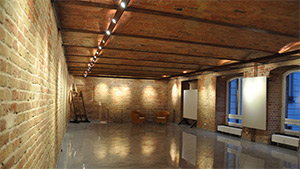 Gallery ZURAG Berlin 2012
Gallery ZURAG Berlin 2012
Zurag, the first Mongolian art gallery outside of Mongolia, received
lots of attention, especially from the Mongolian side: The current
Mongolian president T. Elbegdorj was present at its opening in 2010 and
in Mongolia it already became something of a household name. It is
where Mongolian but also German and international artists exhibit their
work. Essentially though, as he tells me, it simply is an art gallery
for artists. And so it fits that the Mongolian word Zurag stands for a multitude of meanings: it can mean painting, photograph, drawing, picture, illustration or depiction.
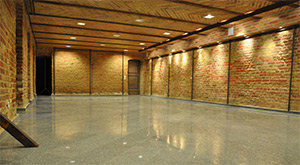 Gallery ZURAG Berlin 2012
Gallery ZURAG Berlin 2012
Otgo's calm
voice echoes through the large room with its brick stone walls. I take
a look around and after peaking at his art work on the lower floor we
finally sit down and I ask my first question: "Which words come to your
mind when you think of Mongolia?" Otgo finds this question rather strange and looks at me first in astonishment, then says more determined: "My home!"
Dressed casually in a dark
sweater and a dark pair of pants, the 31-year-old who is sitting in
front of me has been painting ever since he was a little boy. After
studying traditional Mongolian painting in Ulaanbaatar, Otgonbayar
Ershuu came to Germany in 2005 and continued his studies at the Berlin University of Arts from which he graduated with a Masters of Arts in "Art in Context". His graduation project was the illustration of "The Secret History of the Mongols" as comic book
based on the traditional Mongolian painting style. With Zurag he turned
his passion into a business and finally established his own art
gallery. Otgo's
gentle facial features lighten up. "Now I’m in Berlin so I'm a
Berliner." He tells me that wherever he is, he adapts. "After all, I am
Mongolian", he says and adds: "Although I’m in Germany Mongolia is
always there! "Every year he visits Mongolia once or twice because of
his work but also because he is homesick and has a strong nostalgic
yearning for "everything that is Mongolia: the food, the wind, the sky,
... everything!" Yet, as he explains, he also longs for the
not-so-pleasant parts of life in Mongolia because "life is dynamic: It
is day and night, good and evil".
Whenever Otgonbayar Ershuu (his
artist name is OTGO) visits Mongolia he tries to escape Ulaanbaatar
(UB) because, as he says, he wants to "really" feel and see Mongolia.
"Not that UB is not Mongolia", he quickly adds. „But it became strange.
Mongolia is simply not a sedentary nation and the city [Ulaanbaatar] is
not meant for one million inhabitants." Despite these limitation, in Otgo's
opinion, this [urbanization] is a normal process because "nomads are
curious". As he puts it, nomads have no established city culture which
manifests itself for example in UB's terribly chaotic lack of streets.
"People are driving cars as if they would be riding horses. It takes
time to learn."
I am curious to know what Otgo
likes to do whenever he visits the Mongolian countryside. His immediate
response, and quite to my surprise, is: "Scream." According to Otgo,
everybody defines his or her freedom differently. In the city, so his
explanation, one is constantly surrounded by walls, one’s voice gets
quieter, possibly to be more polite but "it is impossible to really
scream." His screaming functions, as I am made to assume, as venting
energies in a good, non-violent way. He goes on that screaming in urban
places differs from screaming in open space, and delves into more
psychological matters. "Like clothing, whether elegant or poor", he
argues, "the environment around you enwraps you and subconsciously
affects your behavior". And from spending much time in the city, as Otgo noticed, he already feels that his own voice getting quieter and quieter. Almost melancholically, he whispers: "It"s a pity".
This makes me ask him whether he feels more comfortable in the city or in the Mongolian countryside and Otgo,
replying in a matter-of-fact tone, says: "I’m an artist, this means I
need to experience. When I'm in the countryside, I enjoy it. But only
for a certain time because I am young, I am not used to this kind of
life and after a while it gets boring." A visit to the countryside for
him is “like a journey".
Here, Otgo
is always on the move, may it be by car, on feet or on horseback. Like
anticipated, the latter acts as keyword and for the next few minutes Otgo
passionately talks about the art of horse riding and the difference
between Mongolian and German horses ("German horses are too pretty").
"Horse riding, preferably on young wild Mongolian horses", so Otgo, "is fun; You live and interact with nature".
We come to talk of his choice of accommodation and I wonder whether he stays with nomadic herders in their gers. "Of course!" Otgo exclaims. "It’s Mongolia! Everyone, with good or with bad intentions, is welcome!"
As we continue the interview, I wonder how Otgo
would describe the current situation in the country of his birth.
"Talking of the economic situation and the natural resources", he
begins, "I compare it to the film Avatar. "Otgo
is serious now. "It’s about problems and Mongolia has huge problems
because it has many resources. At first one may think "Ah, Mongolia is
lucky, they have so many natural resources‟ but that’s the problem.
Political people are not able to distribute the money well. Instead,
they have private interests and well, first of all they want to get
richer. It’s Avatar! While the people get poorer and poorer, the rich
get richer... "Otgo
compares this to wolves killing sheep: The wolves are too stubborn and
do not share their prey with others, for example with the foxes.
"You can imagine... "Otgo
is upset. "And concerning sustainability and environmental pollution,
they don’t spend any thoughts on that. Foreign companies that enter
Mongolia, they do not think for Mongolia." Otgo
talks fast but his voice remains quiet. "They stay for a short term,
they do not care, they show no concern whatsoever and they know there
is corruption."
Otgo
tells me that he remembers the time of the political change around 1990
very well. "Everybody was hungry", he recalls. "There was money but no
food in the stores; sometimes just pepper, you know, Mongolian
products. Then you are hungry. "Otgo's parents worked in a newspaper factory and had the possibility to sell newspapers in addition to their income. Also Otgo,
barely 10 years old, sold newspapers on the street. "Everyone somehow
had to work. In the summer, we were selling drinks... Many of my
generation remember."
Coming
back to his art, I question Otgo about any political intentions he
might express. By painting myriads of horses on large canvasses, he
undoubtedly makes strong references to the nomad culture. "Politics
influence you", he tells me. "Sometimes without knowing."
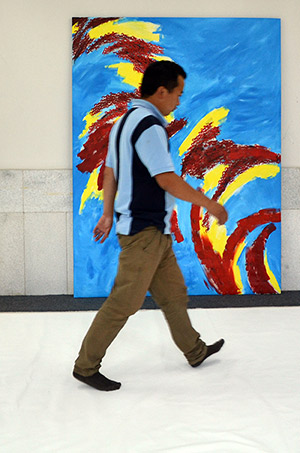 OtGO & OtGO Studio Berlin 2012
OtGO & OtGO Studio Berlin 2012
Also
the issue of urbanization finds a voice in his art. "It’s difficult to
stop urbanization. It’s everywhere, also in Berlin! "Otgo
tries to make point. "The city is the centre. There you have many
possibilities and young people can move freely. I can understand that."
As he continues Otgo
explains that the nomadic life is very difficult for young people,
especially if you are not used to it. The need for information plays a
crucial role, too. "For Mongolians education is important", he adds.
"So young ones try to go to the city and study. You want to enjoy life.
After living a city life it is difficult to return to the nomadic
life." As he puts it in short: "If they come, they’ll stay."
"Otgo,
have you ever thought of living a traditional nomadic life?" I
wonder. "Sure, it’s fun. I like to do this for one to three months, it
brings relaxation. There is no stress. "With the diligence of a
teacher, he points out to me that "stress" has no place in the nomadic
vocabulary. "Stress is a word for the city. In the countryside there is
no stress. There is a certain dynamic but with nature there is no
stress." Again we come to speak of the large-scale migration into the
city. Otgo sees the reasons for urbanization in Mongolia not only in the need for education. In the city "it is easier to live", so Otgo. "Nomadic life is like 200 years ago! Young people cannot live such a life, not like older people who are used to it."
Talking of young and old,
traditional and modern life in Mongolia, I am curious to know what he
thinks: "What is Mongolian?" Without being able to define this, Otgo
now asks me with a smile: "What is art? This is a question that can't
be answered. There are many opinions on that!" He hints at the danger
of prejudices and rhetorically asks whether Germans are "punctual,
pedantic, and Nazis".
"Mongolian", he begins to
explain, "is historically seen, an invented word. Scientifically it is
not proven." The word mongol first appeared in „The Secret History of
the Mongols" but there is no proof as to what it actually means. Otgo
refers to Chinggis Khan who was "wise because he chose a name that
unified different ethnic groups. In need of a name that could represent
a big empire and a long history, he chose mongol", so Otgo
who agrees that of course history may be falsified. "But he [Chinggis
Khan] also could have said that this is the Empire of the Chinggis", Otgo
says with a grin. "There is no mongol nationality, it’s an invented
land like the USA." Altogether, he questions the politics of labeling:
"Is my art Mongolian? Or is it Berlin Art? German art?" Otgo finds such wording very strange.
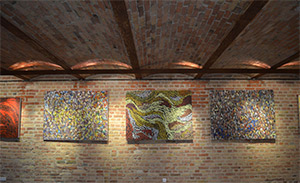 OtGO Show – Gallery ZURAG Berlin 2012
OtGO Show – Gallery ZURAG Berlin 2012
But to be a Mongolian artist
in Berlin is a chance for him. Besides, as he says himself: "I am
Mongolian. That means I have to think like Mongolians, for example like
Chinggis Khan, like my ancestors. The word mongol does not have much of
a definition. It is a neutral word, it has no meaning. This stands
behind my idea: Wherever I am there is Mongolia."
Often, but not exclusively, the art in his gallery has a connection to Mongolia. Otgo's
aim is to enable dialogue, cultural exchange and to "build bridges"
which he does with the help of networking (supporting Mongolian artists
in Europe and likewise supporting German artists in Mongolia). Otgo
answers my question whether he feels a certain pride by being called
"Mongolian artist" simply with: "You need pride. I live from that. This
is my motivation, it’s like an idea that comes magically." Talking of
the reactions he gets for his art, Otgo
remarks that Mongolia makes people curious. "Mongolia? It almost has a
magical meaning, like a fairy tale." For some people it is "an exotic
country with people that are close to nature or things like that. This
simply is power of imagination."
Otgo
tells me the story of a Swiss film team that visited a nomadic herder
family in the Mongolian countryside. After talking to the family in the
ger (Yurt) ,
the film team went back to their jeep to set up the camera equipment.
When returning to the ger, they found everything neatly arranged, the
family members had put on their best deels
(clothing) and the women had also put on makeup. A discussion followed
because the film crew did not want to shoot the film and the Mongolians
did not understand the fuss. For the film they wanted to look
representative and "beautiful" but now the film concept did not work
any longer for the Swiss team.
Otgo
understands both sides but swiftly adds that for him the mentality of
the nomads is "to be always beautiful". Upon asking him what he means
by saying that, Otgo has difficulties explaining it further. Instead, Otgo
describes the nomadic mentality with the following examples: When
nomads see someone in the distance, they first make tea and then they
take their binoculars to see (exactly) who is coming. Once the visitors
arrive at the ger the tea is
ready! This great hospitality also gives insight to other interpersonal
aspects. When nomads are traveling and one is tired, nomads help each
other out, so Otgo.
In the city when people meet on the street they quickly greet one
another while in the countryside, as Otgo tells me, "you have
time. You take time." May it be with traditional Mongolian snuff or by
smoking a cigarette; you exchange news which may take „one or two
hours, maybe half an hour". These customs however are impossible to
live in the city because "there is always the need to adapt", so Otgo.
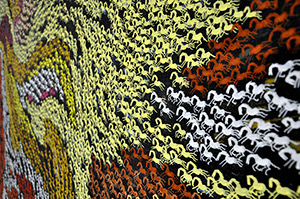 Roaring Hoofs -12 by OtGO 2008. Tempera on cotton, 120 x 160 cm
Roaring Hoofs -12 by OtGO 2008. Tempera on cotton, 120 x 160 cm
We come to talk of music and which kind Otgo likes and preferably listens to. Otgo
does not have to think about this for a long time and puts it this way:
"I listen to anything that sounds good! If food tastes good, I eat it!
If music sounds good, I also listen to Indian music." Talking of other
traditional Mongolian customs like the game Shagai (Shagai
is the Mongolian ankle bone game. Taken from sheep or goat, the ankle
bones are used to play dice, the so-called ankle bone shooting or they
can also function as means of fortune telling), Otgo says that "of course" he played it in his childhood but now not anymore.
This leads me to the question
what exactly from the Mongolian culture he wants to pass on to his
children. Clearly, language means a lot to him. "If you have language,
then you have culture. Language opens the door for culture." I hear Otgo
say. „So it is my task to teach my children Mongolian. I would blame
myself if they wouldn’t learn it." Sometimes, as he tells me, he
forgets to celebrate traditional Mongolian festivities like Tsagaan Sar or Naadam
because „here [Germany] is no atmosphere". Only when his family and
friends send him text messages or e-mails he feels reminded. Otgo
does not celebrate those festivities intentionally but he "is always
happy when there is a gathering [in Berlin], and people come together,
talk in Mongolian and eat buuz (Buuz: steamed, handmade dumplings filled with minced meat. Buuz are a Mongolian national dish. )".
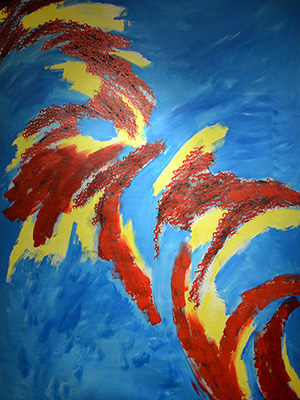 Roaring Hoofs-26 by OtGO 2012, acryl on canvas, 200 x 150 cm
Roaring Hoofs-26 by OtGO 2012, acryl on canvas, 200 x 150 cm
OTGO Studio Berlin 2012
It
is very common that when gathered together, Mongolians sing. "Every
Mongolian can sing", claims Otgo. "You do not have to be an artist.
That would be boring." While he listens to both traditional and modern
Mongolian music, he claims that he does "not put Mongolia music on
YouTube on purpose". But then after giving it more thought Otgo admits that sometimes it does happen. "Sometimes there’s homesickness", Otgo speaks slower now. "Then unconsciously one can sing Mongolian. That’s the way it is. But it's good the way it is." With little gestures, Otgo
tries to express his thoughts: "Whenever I am homesick, I feel good.
When I am homesick, it's actually not pleasant... It makes you sad but
still I think it is good to feel homesick... Then you feel you are
connected to Mongolia. That’s always nice."
Now Otgo addresses me and "people who have Mongolian roots and who are on the move" (Otgo does not like the German word "Ausland")
(The German word Ausland refers to all foreign countries. It is a
non-specific location abroad.). As he says: "Everybody has a certain
task which is not formulated as such, but it is to communicate your
roots. This can be everything. It does not have to be nice art; it can
be how you think about Mongolia, simply your perspective."
Otgo
continues: "Mongols are adaptable. Sometimes too adaptable." Trying to
give an example he says that, generally speaking, some people [...] who
have been living in Germany for 30 years, show no or little signs of
integration, especially language-wise. In Otgo's opinion this clearly is a problem. "In this regard Mongolians have no problem." But Otgo
points out: "It is even the other way around; some Mongolians have to
be reminded to be Mongolian." "In Germany", he says, "there are lots of
Mongolians who grew up here but who cannot speak Mongolian. I think
that’s really a pity." Otgo
shares his thoughts: "On the one hand, I understand that because they
are nomads. Nomads are adaptable. From childhood on, there is this
mentality; this character trait. Even though they might not have to do
with nomads, this character trait is always there."
This seems to be a delicate
subject. "Have you ever been criticized for being German?" I wonder.
"No! Never... Well ... Sometimes a bit, yes." Otgo
considers my question. "When I meet up with people in Mongolia, when we
have an appointment and they don’t show up... This annoys me a bit."
When Otgo
visits Mongolia, for example when he has business to do, he says that
he sometimes forgets the Mongolian mentality. But also when going out
to the pub with his friends, he tells me he has to wait two hours for
them. "They don’t feel any guilt. But when I tell them, they say I am
German not Mongolian." Upon asking if this hurts Otgo finally says a bit halfheartedly: "It’s just for the fun of it".
After having lived seven years in
Germany, "somehow" as he says, he feels at home in Germany, too. But
does he feel torn inside? "No", he says decisively and looks as if he
wonders why I come to ask such questions. Otgo
ventures further: "In the course of human development the best time of
your life is between the age of 24 and 31 because "you are open". This
played a big role for him because Otgo
spent these years in Germany. He tells me that he still dreams in
Mongolian and that, of course, he also thinks in Mongolian. But the way
Otgo speaks German is quite eloquent. Otgo recounts his learning process and clarifies: "If you can’t think in German, you can’t speak German!" However Otgo also admits that he does not want to stay any longer. „I have to leave and work on new beginnings!"
For now, Otgo will not settle in Mongolia because, as he explains, he always visits Mongolia; every year. Otgo feels like he is on a journey: "And one day I will return to the starting point. But not now." Also, while Otgo
passionately talks about Mongolia, he says that with a Mongolian name
„you are an ambassador for Mongolia" because you are always recognized
as being Mongolian. "So you see yourself as ambassador?" I ask. "Yes,
but not only me. Everyone who is on the move from their home is an
ambassador!"
As it is getting late, I ask him about his outlook. "In your opinion, how will nomadic life be in 10 years time?" Otgo
lowers his eyes. "It will be less and less. People become settled.
Human beings", he explains, "are creatures of habit. Everyone wants to
enjoy a lot and not move around anymore because this costs energy; it
is work." History showed that the intervals of nomadic movement were
increasingly becoming smaller. According to Otgo
"the moving used to be nearly every week, then every season, ... It is
a lot of work and tiresome. Now people want to build a house, start a
company and commit to a sedentary lifestyle." Otgo
says this process is inevitable. „One day, the nomadic lifestyle won’t
exist anymore", he concludes. "But how long? Hopefully it will take a
while."
Coming back to his art once again, we talk about its different meanings. For Otgo,
he says "it has two characters; the outside and the inside". Later we
stand in front of a huge, colorful canvas that measures an incredible
6.6 meters in its length and 2.17 meters in its height. "Hun"
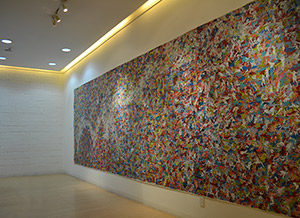 HUN by OtGO 2010–2012. acryl on canvas, 217 x 660 cm
HUN by OtGO 2010–2012. acryl on canvas, 217 x 660 cm
(Hun is the Mongolian word for 'human'. Quite intentionally, Otgo
chose the Mongolian word to 'educate people on Mongolian language'. )
depicts more than 20 000 human and animal figures that are intertwined
in bizarre and often horrid positions. This impressive work took Otgo
more than two years to finish. Other paintings show thousands of tiny
horses, frozen in colorful movement. By stepping further away, the
horses vanish and form dynamic waves that are skillfully captured in
all their fragileness.
"Thinking of nomadic life, the pain is always there." Otgo
tells me. "But my possibilities are limited." For him, art has to have
a secret. "Through art, people have to be able to feel. Art should
engage everyone in a dialogue. And later", he adds, "hopefully there
will be understanding."
And so it is that at the end of the interview we come to speak of today’s world. "In highly developed countries", so Otgo,
"people are yearning for what is original, for what is natural" He
predicts that terms such as eco, bio and organic hint at a bigger
problematic. My recording device stops but nevertheless we continue to
talk about the increase of the world population, the emergence of new
diseases and the idea behind the "new" organic movement. At first
sight, one may not fathom that with his impressively colorful and vivid
work, Otgonbayar Ershuu paints much darker and disturbing pictures.
Between all the painted figures and their raw nakedness, I find his
signature. Above the vertical writing "OTGO", perhaps in reference to
the traditional Mongolian scripture which is also written vertically, Otgo simply leaves the tiny round maze of lines that is his finger print.
It is my last question. On many
photos on his website I see him dressed in traditional Mongolian
clothes, since, I wonder what this means to him. "I’m an ambassador,
yes, I present Mongolian culture. At special events I consciously
choose to dress in Mongolian clothes. It’s almost like a performance."
There is fascination in Otgo's
voice. "I am relatively short in height and among all the taller
people, my Mongolian clothes are an eye-catcher. People can recognize
me faster and ask me their questions. This is great to think of, also
for business."
It is late now and we leave
Zurag, continuing the discussion. At the crowded underground station,
while the train arrives and the people are set in motion, I quickly
wish him all the best and, in a brief moment of silence, say "bayarlalaa". Caught in surprise, Otgo smiles back and there we depart.
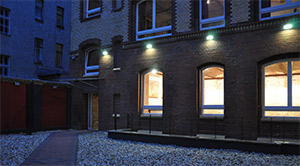 Gallery ZURAG Berlin 2012
Gallery ZURAG Berlin 2012








